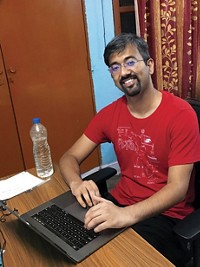Advertisement
Grab your lab coat. Let's get started
Welcome!
Welcome!
Create an account below to get 6 C&EN articles per month, receive newsletters and more - all free.
It seems this is your first time logging in online. Please enter the following information to continue.
As an ACS member you automatically get access to this site. All we need is few more details to create your reading experience.
Not you? Sign in with a different account.
Not you? Sign in with a different account.
ERROR 1
ERROR 1
ERROR 2
ERROR 2
ERROR 2
ERROR 2
ERROR 2
Password and Confirm password must match.
If you have an ACS member number, please enter it here so we can link this account to your membership. (optional)
ERROR 2
ACS values your privacy. By submitting your information, you are gaining access to C&EN and subscribing to our weekly newsletter. We use the information you provide to make your reading experience better, and we will never sell your data to third party members.
Careers
Scientists Condemn Iran Crackdown
Iranian scientists abroad decry attacks on universities
by Amanda Yarnell
June 29, 2009
| A version of this story appeared in
Volume 87, Issue 26

As mass protests in Iran continued last week in the wake of the country's hotly disputed presidential election, Iranian scientists living in the U.S. condemned violent attacks on university campuses by Iranian security forces.
Iranian officials maintain that the incumbent, Mahmoud Ahmadinejad, won the June 12 election by an overwhelming margin. As demonstrators alleging electoral fraud took to the streets, the Iranian government sought to quell opposition, particularly on university campuses.
Members of the Iranian security forces have raided universities and many student dormitories in Iran. In one of the dormitories in Tehran, several students have been killed, according to a letter published in the July issue of the American Physical Society's APS News by the board of directors of APS's Iranian-American Physicists group. In that letter, the group condemned "such violent attacks on the universities and student dormitories."
Universities should be considered off-limits to arbitrary intrusions by Iranian security forces, says Davood Rahni, a professor of chemistry at Pace University and a member of ACS's Iranian Chemists Association. The Iranian government has purged many professors from universities in the past four years, he says.
Iranian officials have severely curbed international journalists' activities in Iran, and as a result, much of the information trickling out of that country has come from social networking sites such as Twitter. In the week following the election, there were reports on the site of mass resignations by faculty in the chemistry department at the nation's leading science and engineering university, Sharif University of Technology.
These rumors "are not true," says Fredun Hojabri, a former chemistry professor and academic vice president at SUT who now lives in San Diego. "It would be also not a right move to resign and let the government control the university," he adds.
SUT has been closed for more than a week, and its final exams have been postponed until the beginning of July, according to Hojabri, who remains in contact with former colleagues and friends at SUT and elsewhere in Iran. The chair of the chemistry department and other faculty members at the university declined to speak with C&EN for this article.



Join the conversation
Contact the reporter
Submit a Letter to the Editor for publication
Engage with us on Twitter